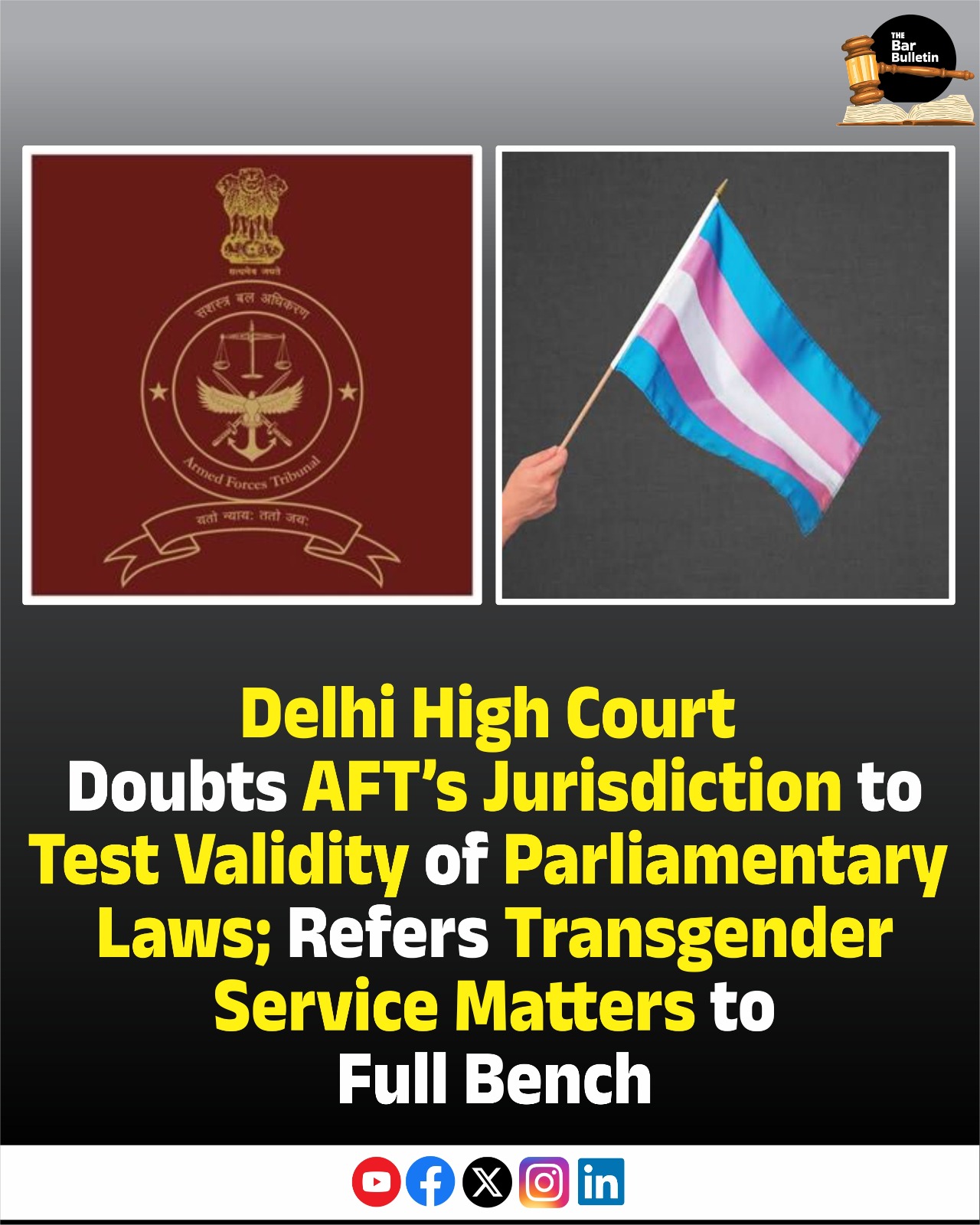The Delhi High Court, on September 26, 2025, heard a petition filed by a former Navy officer challenging the jurisdiction of the Armed Forces Tribunal (AFT) and the Navy Act, 1957, which was allegedly non-inclusive of transgender rights with regard to policy framing for recruitment and service conditions of transgender persons. Justices Om Prakash Shukla and C. Hari Shankar observed that since the matter raised significant questions regarding the AFT’s competency to decide the vires of parliamentary legislation, they referred the case to a Full Bench of the Court to be led by the Chief Justice.
The petitioner was enrolled as a sailor in the Indian Navy under the Senior Secondary Recruit (SSR) category and was administratively discharged on October 6, 2017 under Navy Regulations on the grounds of his Services No Longer Required (SNLR). The matter arose when the petitioner began suffering from gender dysmorphia by identifying as a female and sought medical intervention. However, instead of receiving medical support, the respondents subjected him to psychiatric counselling. Following this, the petitioner underwent Sex Reassignment Surgery (SRS) in a private hospital in Delhi in October 2016 due to which the respondents allegedly confined him to a psychiatric ward for five months without justification and subjected him to multiple medical assessments. After rejoining duty in April 2017, he was issued a show cause notice where his services were terminated stating that existing service rules did not permit continued employment due to his altered gender status and medical condition. The petitioner being aggrieved, approached the Delhi High Court seeking to quash the discharge order dated 04.10.17, along with consequential reliefs such as reinstatement with back wages, compensation, and framing of policies for recruitment and service conditions of transgender persons. He also challenged the constitutional validity of Section 9 of the Navy Act, 1957 along with some Navy Regulations (Part 3), by contending that they are unconstitutional as they fail to recognize the identity and rights of transgender persons.The respondents argued that the petitioner, despite repeated warnings under Regulation 279 of the Navy Regulations Part III, continued to display indiscipline — lying to his officer, keeping long hair, wearing nail polish, trimming eyebrows, and refusing to maintain service-like appearance. He also underwent gender reassignment surgery in a civil hospital without informing naval authorities, rendering him medically unfit for sea duties leading to his discharge.They further raised a preliminary objection on maintainability, asserting that the Armed Forces Tribunal (AFT) was the appropriate forum for such matters, as it could also examine the vires of Section 9 of the Navy Act, 1957. Hence, they sought dismissal of the petition before the Court.
The Court examined whether questions involving the vires of a statute fall within the jurisdiction of the AFT or the High Court. It relied on L. Chandra Kumar v. Union of India (1997) 3 SCC 261, where it was noted that while Tribunals can adjudicate matters involving the vires of statutory provisions and subordinate legislation, they cannot examine the vires of their parent statutes.The Court observed that the AFT, comprising Judicial and Administrative Members, is equipped to decide constitutional issues related to service matters of armed forces personnel. It also referred to Neelam Chahar v. Union of India WP(C) 9535/2017 , which recognized the AFT’s power to review vires of statutory provisions and that extending this to Central Acts like the Navy Act, 1957, raises jurisdictional questions. The Court therefore considering the importance of the issue referred the following questions to a Full Bench:
(i) whether the AFT can adjudicate on the vires of statutory legislations other than the AFT Act, such as Section 9 of the Navy Act, 1957;
(ii) whether Neelam Chahar empowers the AFT to examine the vires of such Central legislations; and
(iii) whether this principle would extend to all Tribunals not constituted under Articles 323A and 323B.
The matter now stands to be placed in the Court before the Chief Justice for appropriate orders.
Appearances:
For the Petitioner : Advs. Mr. Trideep Pais, Sr. Adv with Ms. Amritananda Chakravorty, Mr. Mihir Samson, Ms. Shreya Munoth, Ms. Sitamsini Cherukumalli, Ms. Saloni Ambastha, Ms. Sakshi Jain and Mr. Pradip Kumar Singh
For the Respondents : ASG Mr. Chetan Sharma with Mr. Piyush Beriwal, Ms. Ruchita Srivastava, Mr. Amit Gupta, Mr. Vidur Dwivedi, Advs. with Mr. Naman, Commander Akarshan

